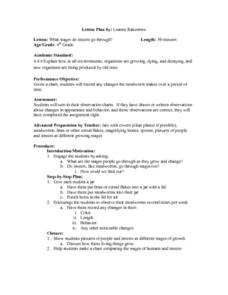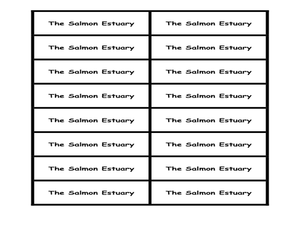Curated OER
Life Cycle
Seventh graders make a collage of the human life cycle. In this life cycle lesson students study the human reproductive system and the general concepts of pregnancy. Students receive detailed information about the human life cycle and...
Curated OER
Animal Life Cycles
Learners participate in numerous activities to gather information about parts of the life cycle. In this life science lesson, the teacher choose from a number of activities to create or support an interdisciplinary unit about the life...
Curated OER
From Caterpillars to Butterflies: Life Cycles
Second graders listen to a read aloud of the Eric Carle's, The Very Hungry Caterpillar, and talk about the life cycle of caterpillars. They draw illustrations of the life cycle and compare it with the life cycle of another familiar...
Curated OER
How 'bout them bones!
After a lesson on the human skeleton, hand out a worksheet that requires learners to identify the pelvis, rib cage, skill, spine, and thigh bones. They draw a line from the name of the bone to its location on the skeleton. Tip: Instead...
Curated OER
What Happens in the First Nine Months?
Students explore human development using Internet resources that contain text, drawings, photos, and video about human development. They research a trimester of pregnancy then create drawings to show what is happening to the fetus during...
Curated OER
Raven Chapter 12 Guided Notes: Sexual Reproduction & Meiosis
Young biologists define reproduction vocabulary terms, answer critical-thinking questions, label a diagram of the human life cycle, and complete a chart comparing mitosis to meiosis. This is a well-balanced worksheet. Even though it...
Curated OER
Walter Reed's Yellow Fever Studies
Middle schoolers and high schoolers examine the ethics of using human test subjects in scientific research. They do a simulation which focuses on yellow fever and how human subjects were used to develop a treatment/cure for the disease...
Michigan State University
Bug Lyphe!
Introduce ecology classes to biodiversity and interdependence in ecosystems with a PowerPoint presentation. Then, they get up-close and personal with the invertebrate world by collecting insects, classifying them, and graphing their...
Curated OER
Plant Lifecycles
Students examine the life cycle of plants. In this plants lesson plan, students identify the various stages of plants and their parts. Students compare the life cycle of a plant with that of an animal. Activities suggested can be...
Curated OER
Introduction to Human Anatomy & Physiology
If the only support you are in search of is lists of vocabulary terms, this presentation may fit the bill. Slides simply list terminology. These categories are included: hierarchy of structural organization, cell functions, cell...
Curated OER
Human Development
High schoolers brainstorm about the physical, emotional, and social developmental milestones of human beings. They complete a timeline as a class that begins with birth and ends with death. Students identify whether each milestone is...
University of Arkansas
Assessment and Discussion
"Without concerned citizen action to uphold them (human rights) close to home; we shall look in vain for progress in the larger world. . ." Eleanor Roosevelt's comment is used to set the stage for the conclusion of a five-lesson unit...
Curated OER
What Stages Do Insects Go Through?
Fourth graders observe mealworms over a period of time and record any changes they observe. They record any changes in color, length, behavior, and any other noticeable changes, identify the stages of the mealworms, and create a chart...
Curated OER
The Salmon Estuary And Human Impacts
Students have discussions and complete activities about the pacific salmon life cycle and marine parasites. In this salmon lesson plan, students complete activities such as observing sea lice, playing a tag game, and a board game.
Curated OER
Life Cycle Of Stars
Students analyze characteristics that indicate human life cycles, and then apply these observational principles to various NASA pictures of stars to synthesize patterns of stellar life cycles. They observe NASA images of stars at various...
Curated OER
Ping!
Using "mystery bathymetry" shoeboxes, young explorers simulate sonar action to map out the topography of an un-viewable landscape. This classic activity helps physical oceanography learners understand how sonar works. It would be...
Curated OER
Youth Voices: Fair Access to Resources and Quality of Life
Student delegates conduct "United Nations" style session in which they are challenged to develop resolution or resolutions that address how to feed growing population, taking into consideration quality of life and impact on environment.
Curated OER
Do You Have a Sinking Feeling
Students determine how marine archaeologists use historical and archaeological data to draw inferences about shipwrecks. Students plot the position of a shipwrecked vessel, and draw inferences about the shipwreck from artifacts that have...
Curated OER
Building A Bug Bungalow
Learners chart how milkweed bugs grow and change. In this growth and life stages activity, students read two stories and discuss how and why things grow. Learners brainstorm what can be measured about humans, review and discuss life...
Curated OER
HIV and AIDS: Understanding Risk Behaviors
Eighth graders research human sexuality by completing a sexual health worksheet. In this HIV lesson plan, 8th graders define AIDS and list the ways it can be transmitted from human to human. Students assess their own risk and complete...
Curated OER
Biomechanics of Sports
Students examine the body's major organ systems and how they function and influence each other. They examine how the human body moves when involved in sports.
Curated OER
Hermit Crabs Lifecycle & Stages
Students review the life cycle of land hermit crabs by viewing a poster or transparency. They identify the different body parts of a hermit crab and what each part is used for.
Curated OER
Never Say Die: The CLock of Life
Students explore ways to turn back the genetic clock. They explore cells and mitosis. Students participate in an activity to create a flip book that will animate the process of mitosis. They explain each stage of mitosis.
Curated OER
Effects of Water Pollution on Aquatic Organisms
Students investigate water pollution. They develop an understanding of the behavior of organisms, of the structure and properties of matter, and of natural and human induced hazards by conducting lab tests. They present their data...

























